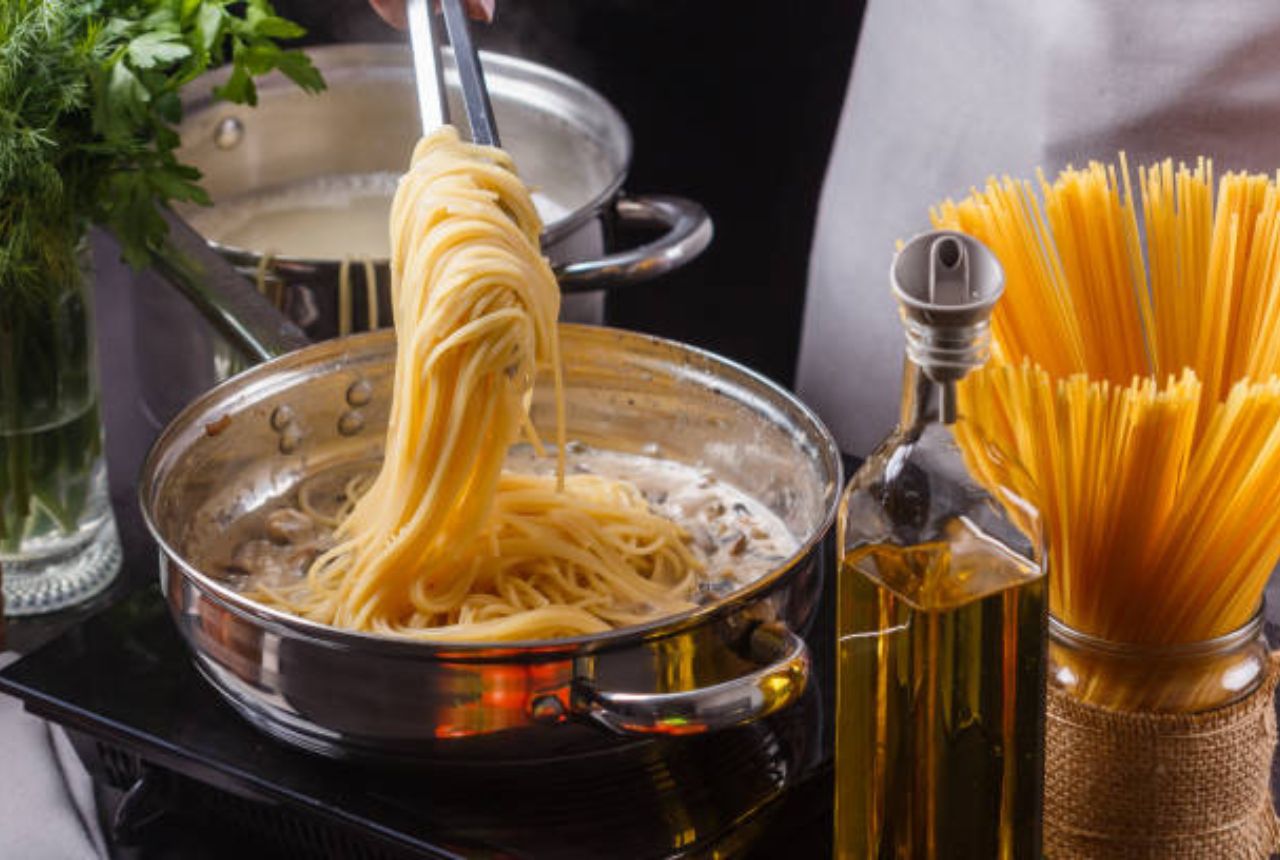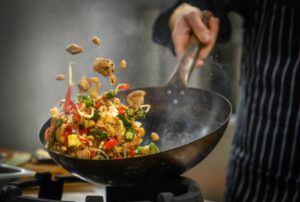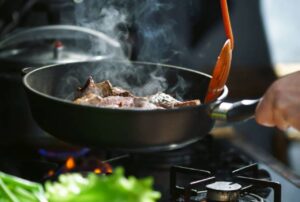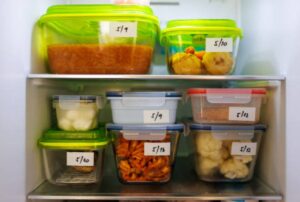So, you’ve boiled water, tossed in some pasta, set a timer, and still ended up with a mushy mess that could double as wallpaper glue. Sound familiar?
Yeah, been there. Nothing crushes the soul quite like watching your beautifully plated fettuccine collapse into limp, lifeless strands with zero bounce. But hey — you’re not alone. Overcooking pasta is one of the most common kitchen crimes. And honestly, it’s not entirely your fault.
The good news? You can totally fix it. And no, it doesn’t involve going to culinary school or spending a fortune on fancy gear. Just a few smart adjustments and a bit of kitchen common sense.
Let’s break it down (with zero judgment, promise).
You’re Probably Cooking Pasta Like This — And It’s Sabotaging You
You Trust the Box Instructions Too Much
Let me guess: you dump the pasta in, look at the box, and say, “Okay, 11 minutes it is.”
Big mistake. The instructions are more like vague suggestions. That cook time doesn’t account for your stove, your water level, or your pan.
Here’s what actually works:
- Start checking 2–3 minutes before the shortest time on the box.
- Bite into one. Is the center a bit firm but not raw? That’s your sweet spot. That’s al dente.
- Trust your bite, not the box.
You Leave It Sitting After Draining
Ah yes, the ol’ “I’ll just finish chopping the parsley real quick” trap.
Spoiler alert: pasta keeps cooking even after you drain it. It’s like that one friend who overstays their welcome.
Here’s the fix:
- Drain and immediately toss the pasta in your sauce.
- Or — if the sauce isn’t ready — rinse the pasta briefly with cold water to stop the cooking. (I know, Italians everywhere just gasped. But desperate times…)
Your Pot (And Water) Game Is Weak
You’re Not Using Enough Water
If your spaghetti’s sticking together like an awkward group hug, you’re not giving it room to move.
Use a big pot and lots of water. Think:
- 4–6 quarts of water per pound of pasta.
- Bonus: lots of water helps keep the temperature stable and reduces the chance of overcooking.
You Forgot to Salt the Water
“No biggie, I’ll just salt the sauce.” Uh, no.
Salting your water is critical. It’s the only chance your pasta gets to absorb flavor.
- Use at least 1–1.5 tablespoons of salt per pound of pasta.
- Don’t worry — most of it stays in the water. Your arteries are safe.
You’re Adding Pasta Before the Water Boils
This one’s a trap. You get impatient (don’t we all?), and you throw in the pasta early. But instead of cooking evenly, it turns gummy.
Pro tip:
- Wait until the water hits a full, rolling boil.
- Not a simmer. Not a “meh” bubble. We’re talking jacuzzi-level bubbling, okay?
Your Timing Is Off — And Not Just the Cooking Time
You Wait Too Long to Start Your Sauce
Ever rushed to drain the pasta… only to realize your sauce is still a half-chopped onion and two YouTube ads away from ready?
By the time your sauce hits the pan, your pasta’s already overcooked.
The fix? Start your sauce before your pasta.
Here’s how I do it (and trust me, it saves stress every time):
- Simmer or prep the sauce first.
- Boil water in the meantime.
- Add pasta only when you’re ready to combine the two as soon as it’s drained.
You Ignore Carryover Cooking
You know how steak keeps cooking after you take it off the grill? Pasta does too.
If you want perfect al dente, take it off the heat while it’s still a touch underdone. Especially if you’re finishing it in the pan with sauce (which you should be doing, by the way — it’s a game-changer).
You’re Not Finishing It in the Sauce (Oops)
Okay, this one’s personal. I used to drain my pasta, slap some sauce on top like a school lunch tray, and call it dinner.
But here’s the truth:
- The sauce belongs in the pan with the pasta.
- When you toss hot pasta with hot sauce in the same pan, something magical happens.
- The starch from the pasta water (yup, you saved some, right?) helps the sauce cling to each noodle like it’s meant to be there.
Steps to do it right:
- Drain pasta a minute early and transfer it to the sauce pan.
- Add a splash of reserved pasta water.
- Toss everything together over medium heat for 1–2 minutes.
Boom. Restaurant-level vibes at home.
You’re Cooking the Wrong Pasta for the Dish
Not all pasta shapes are created equal. You wouldn’t wear flip-flops to a snowstorm, right? Same logic applies here.
If you’re constantly overcooking your pasta, maybe you’re using the wrong type.
Some common mismatches:
- Angel hair + thick sauce = total disaster. It overcooks in seconds.
- Thick spaghetti or rigatoni handles hearty sauces way better.
- Delicate sauces pair best with thinner pasta (but only if you watch it like a hawk).
IMO, go for:
- Short pastas (like penne or fusilli) for thick, chunky sauces.
- Long pastas (like linguine) for smooth, creamy, or olive-oil-based sauces.
Bonus Mistakes That Might Be Screwing You Over
You’re Not Stirring Enough
FYI: Pasta needs movement. Stir it early and stir it often.
Why?
- It prevents sticking.
- It helps it cook evenly.
- It keeps you from fishing out a clump of noodles that look like they fused in the pot.
You Cook All the Pasta at Once
Unless you’re feeding an army (or a hangry roommate), don’t cook the whole box.
It’s harder to control the doneness with a full pound swirling around. Plus, leftover pasta never hits the same, IMO.
Fixing Overcooked Pasta (When It’s Already Too Late)
Okay, so let’s say you read this after you turned your noodles into goo. We’ve all been there.
Don’t toss it just yet. You’ve got options:
- Sauté it: Toss the overcooked pasta into a hot pan with butter, garlic, and breadcrumbs. Crisp it up and pretend it was intentional. Works surprisingly well.
- Bake it: Layer it with sauce and cheese and make a baked pasta dish. Once it’s in a casserole, nobody knows what happened before.
- Soup it: Use it in soups where a softer texture actually works.
But seriously — take this as your last overcooked pasta, ever. You’re better than that.
Final Thoughts: Pasta Doesn’t Have to Be That Complicated
Let’s be real — pasta is one of the simplest, most comforting meals out there. But it’s also shockingly easy to mess up.
So next time you’re standing over the stove wondering if your noodles are just right or tragically too late, remember this:
- Taste early.
- Finish in the sauce.
- Use the right tools (and timing).
And for the love of carbs, please salt your water.
Cooking perfect pasta isn’t about mastering Michelin-star skills. It’s about paying attention, making a few smart changes, and not trusting that little cardboard box too much.
Now go make that pasta sing. And hey — if you mess it up again, just add more cheese. Nobody will notice.
Mangia! 🍝







